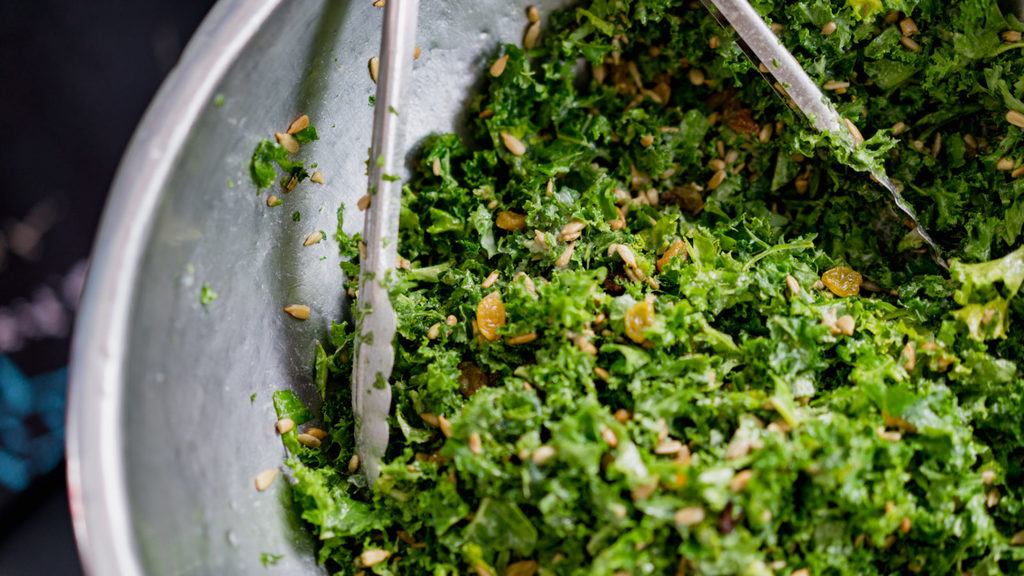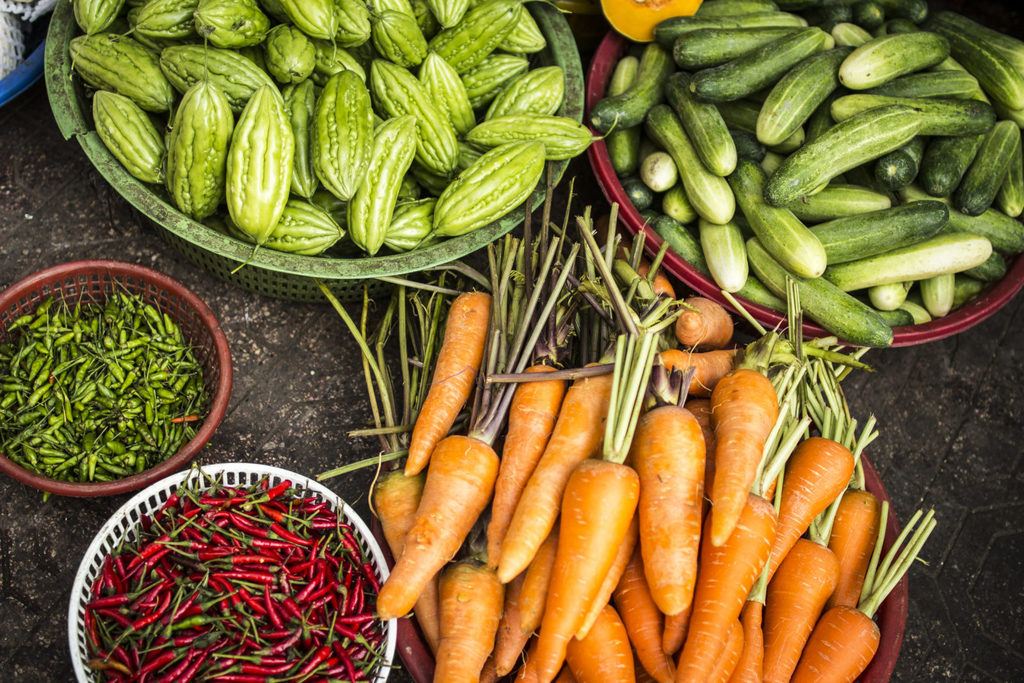- You are here:
- Home »
- research »
- 10 Simple Nutrition Tips to Banish Inflammation, Lose Weight and Feel Your Best

10 Simple Nutrition Tips to Banish Inflammation, Lose Weight and Feel Your Best
Cancer. Diabetes. Heart Disease. These are some of the biggest medical killers in the world, and while they seem random, multiple studies[1] suggest they have a common underlying factor: Inflammation.
Chronic inflammation can make you feel uncomfortable in your own skin. It can zap your energy so you can’t do the things you love. It can make you pack on the pounds so you can’t fit into your favorite clothes.
And researchers[2][3][4] are finding that the standard American diet (i.e., a SAD diet) full of starch, carbohydrates and excessive refined sugar is the leading cause of this inflammation and the consequential rise of inflammatory diseases. In fact, the average adult eats more than 60 pounds of added sugar every single year, and that doesn’t even include sugar from fruit juices![5]
Besides chronic inflammation, this extreme amount of sugar and starch intake is leading to what doctors and dietitians call an “astronomical obesity epidemic”.[6] A whopping 31% of adults are obese, and this number continues to rise thanks to the widespread use of added sugar, high fructose corn syrup and other sweet additives. According to university researchers, manufacturers add extra sugar to 74% of the foods you’ll find in the grocery store.[7]
It’s time to take back control of your health through a return to whole foods, a reduction in sugar, and a nutritional approach to blood sugar stabilization. This is key if you want to get inflammation under control, maintain a healthy weight, reduce your risks of chronic disease and restore your health and wellness. By shifting your diet towards less sugar and a more holistic approach to food, you can help your body to naturally moderate its blood sugar levels.
Are you ready to reset your mind and body, free yourself from a sugar-laden diet and experience renewed vitality and less inflammation?
1) Never just give up any food; always replace or it won’t be a sustainable change

Most diets focus on eliminating specific ingredients or even entire food groups. And when that doesn’t work, the average person’s response is to try even harder at cutting out that same ingredient or food. Yet psychologists say that this focus on simply eliminating food and “trying harder” is one of the key reasons that most diets don’t work.[9]
Instead, you have to look at what psychologists call a habit replacement loop.[10] Instead of just trying to cut out a bad habit, whether it’s eating junk food or biting your nails, you have to replace it with a new and more positive habit.
That’s because the human mind prefers inertia. In behavioral economics, inertia refers to your tendency to want to keep doing the same thing and stick to the same lifestyle patterns. To put that into simpler terms, researchers at Colorado State University say you want to create a sense of maximizing your health benefits without feeling like you’re restricting your choices.[11]
If you want to create sustainable change and improve your health and wellness, don’t just give up an unhealthy food or a bad meal time habit. Replace it with something healthier. For example, if you’re trying to reduce your sugar intake, don’t just ban all refined sugar in your diet. Find low-carb snacks to enjoy whenever you have a craving. This breaks the habit loop and helps you stick with your goals. Plus, low-carb snacks that are high in healthy fats or healthy protein help stabilize and reduce blood sugar better than high-carb, low-protein/low-fat snacks.[12][13] Example options to try include walnuts, almonds and avocados.
2) Choose simple plant-based whole foods and supplement food with food

Animal protein has also been linked to increased inflammation, while many fruits and vegetables contain antioxidants and plant compounds that help reduce inflammation. That may be why studies of patients who suffer from inflammatory diseases, such as arthritis,[15] often see inflammation drop once patients move to a vegan diet.
When considering different plant-based foods, get as close as you can to how Mother Nature intended it. If possible, always choose the whole food version of your food.
Take fruit for example. While juice cleanses and juice detoxes claim to be healthy, extracting juice from the whole food robs you of the fiber and plant compounds found in the fruit’s skin and core. Because fiber helps reduce blood sugar spikes, removing this fiber but keeping all the sugar in the juice can dramatically accelerate how quickly your blood glucose levels rise.
The same is true with grains. Whole grains preserve all of the nutrients, while refined grains strip away the germ, which is where biotin and many other critical vitamins are stored. Plus, the extra fiber and protein in the whole grain helps stabilize your blood sugar better than refined grains.[16] Whenever possible, go for whole foods.
3) Eat a consistent diet, choosing the same simple foods each week

You are experiencing what psychologists and behavioral analysts refer to as the “paradox of choice.”[17] Namely, the more choices you have to make, the harder it is for you to make a decision and the less likely it is that you’ll make the right choice.
Take the guesswork out of your day and eat a simple, consistent diet made up of the same simple, healthy whole foods every week. This also allows you to meal prep. By making a big batch of food all at once and portioning it out into daily meals, you save time, cut costs and create a scenario where you’re more likely to stick with your healthy eating goals.[18]
4) Choose organic whenever possible (max nutrients + min toxins)

It all comes down to soil health. Traditional mass-market agriculture destroys the soil quality in which your fruit and veggies are grown, and as the soil quality goes down, so does the nutritional value of the plants grown in the soil.
It’s no surprise that in a five-decade-long study conducted by the U.S. Department of Agriculture, they found that vitamin C and other critical nutrients went down over the years in more than 40 different types of common produce.[19] Another study found similar results. For example, over the course of several years, researchers found that the calcium content in vegetables dropped by almost 20 per cent.[20]
This means that calorie-for-calorie, we’re getting less nourishment than our grandparents did from the same foods.
In contrast, organic produce was the exact opposite. “There appear to be genuine differences in the nutrient content of organic and conventional crops,” says a report in the Journal of Alternative and Complementary Medicine. “Organic crops contained significantly more vitamin C, iron, magnesium, and phosphorus.”[21] Part of the reason is because organic farmers have to invest more into the soil health, which in turn increases the health and nutrition of the food they grow in that soil.
Of similar concern is the level of heavy metal toxins like cadmium in conventional farming that raising your risk of cancer and other diseases.[22] Organic produce tends to be safer,[23][24] and excessive levels of heavy metals in your food has been linked to hormone problems, inflammation and weight gain.[25]
Exposure to toxic metals has also been linked to poor insulin resistant and may affect your body’s ability to naturally regulate blood sugar, which may be why researchers hypothesize that heavy metal exposure can increase your diabetes risks.[26] By eating more organic and less traditionally grown food, you can limit your exposure to these heavy metal toxins.
If you want to combat inflammation, stabilize your blood sugar, get more vitamins and minerals and feel your best, opt for organic every time. Look for the “USDA Organic” seal and a label that says “100% organic.” If it simply has an organic label, it could be anywhere from 95% to 99% organic. If it says it is “Made With Organic Ingredients,” it could be as low as 70% organic.[27]
If you’re on a tight budget, aim to go organic with the so-called “dirty dozen,” which are the 12 foods that are most heavily contaminated with pesticides and other toxins:[28]
- Apples
- Celery
- Sweet bell peppers
- Peaches
- Strawberries
- Nectarines
- Grapes
- Spinach
- Lettuce
- Cucumbers
- Blueberries
- Potatoes
5) Drink abundant water (no sugary drinks or juices)

For example, drinking more water and keeping your brain well-hydrated can help you to be more focused,[30] think faster[31] and feel happier.[32][33]
Your body also needs water to keep your immune system running, and staying hydrated helps your immune cells respond to infection faster and flush out bacteria.[34] Drinking water also helps hydrate your mucous membranes[35] which keeps virus infections at bay.[36]
Water also supports and nourishes your digestive system.[37] Fiber absorbs the water, which increases fiber’s ability to move food through your stomach and intestines. Water also helps flush food through your body and circulate bile and other enzymes that break down your food.
Water is even vital for everyday movement and keeping your muscles moving optimally.[38] Just a little dehydration can zap your energy and cause fatigue to set in, whether you’re at the gym or just playing with your kids.[39]
And finally, not drinking enough water can increase your blood sugar levels. Because your blood is mostly water, dehydration causes sugar levels to become more and more concentrated.[40] Your body loses water, but the sugar stays behind in your blood. This is why diabetics are cautioned to stay hydrated, and chronic dehydration is a common symptom of diabetes.
Despite all these incredible benefits of drinking more water, nearly 75 per cent of adults are chronically dehydrated.[41] Chronic dehydration can lead to prolonged inflammation, low vitality, chronic high blood sugar (which raises your risks of diabetes) and more.
Stay hydrated by drinking at least eight glasses of pure, clean filtered water every day. Remember, plain is best. Caffeinated beverages, fruit juice and sweetened drinks may only serve to dehydrate you even more, and sugary drinks increase your blood sugar and also amp up your levels of cytokines, which boost inflammation.[42]
To remind yourself to stay hydrated, keep a water bottle with you at all times and fill it up any time you stand up to go somewhere. You can also consider using a notepad or an app to track your water usage. You may be surprised by how little you actually drink!
6) Prioritize healthy fats and proteins (you will feel more full)

Protein is thermogenic, meaning it helps you burn more calories. Studies have found that eating lean protein at every meal increases how long you feel full, helps you maintain a healthier weight, and helps build lean muscle tissue.[43][44] Low carb, high protein plant-based foods include chia seeds, walnuts and almonds.
Healthy fats can also improve how full you feel and how long you stay feeling full. Examples include avocados and pumpkin seeds. Not only do healthy fats help with keeping you feeling full, but these vegan foods are also rich in omega-3 fatty acids. Omega-3s are linked with reduced inflammation, as well as a lowered risk of chronic diseases like heart disease.[45]
Studies have found that by reducing your carbohydrate intake while simultaneously incorporating more healthy fats and healthy proteins, you can stabilize unhealthy sugar cravings, stabilize your blood sugar and even help bring down your blood sugar levels.
7) Minimize carbohydrates, limit fruit intake, supplement with daily nopal cactus

This ratio equals a protein-carbohydrate-fat ratio of approximately 15-50-35. But if you want to bring down your blood sugar and stabilize it, this ratio is out of sync. Researchers[47][48] are finding that we need to eat fewer carbs and eat more healthy proteins and fats if we want to manage our current sugar crisis.
In one study, bringing down carbs and increasing proteins and fats to the ratio of 30-40-30 (proteins-carbs-fats) reduced blood sugar by 40%. And in another study, simply adding a minimum of 5 grams of healthy protein or fat also helped the body naturally manage blood sugar.
Minimizing carbohydrates also includes limiting fruit intake. Sure, fruits are healthy, but most of the ones you’ll find in the grocery store are also very high on the glycemic index. The glycemic index measures how a food affects your blood sugar. And the Linus Pauling Institute warns that high-GI foods will provoke inflammation and spike blood sugar throughout your body.[49]
Common high-glycemic fruit include:[50]
- Bananas
- Pineapples
- Watermelons
If you want to experience optimal health by minimizing inflammation, minimize carbohydrates, especially fruit and other foods that are high on glycemic index.
And if you ever do indulge in carbohydrates, whole food supplements can help. A study[51] found that nopal cactus helped to regular blood sugar levels and decrease blood glucose. Also known as prickly pear cactus,[52] nopal cactus grows across the southwestern United States and is commonly found in Mexican food.
People eat the flat cactus pads when the cactus is young, either cooked or as a jelly. If you don’t have access to fresh nopal cactus, you can also get it as a supplement in the form of a liquid tincture, a powder or a capsule. To moderate blood sugar, many nopal cactus supplements recommend taking 500-650 milligrams a day.[53] As you do when evaluating any form of vitamin or herbal supplement, ensure the supplement contains no gluten, soy or sugar.
8) Optimize digestion with daily probiotics, enzymes, ginger, and turmeric

Not only does poor digestion leave you feeling crampy, bloated and uncomfortable, but it also means you’re not getting all of the nutrition out of your meals that you could. Calorie for calorie, you’re getting less value out of every bite and you’re starving your cells of energy and wellness.
There are several key ways to improve digestion. First, ensure your gut is well-populated with beneficial bacteria. Scientists currently estimate[56] that there are approximately 1,000,000,000,000,000 (10 to the 14th power!) of such bacteria cells lining your gut right now. That’s more bacteria cells than cells in your entire body!
These helpful little microbes aid in digestion, helping you to metabolize the food you eat and even helping you to lower your blood sugar levels.[57] Add more beneficial bacteria and enhance your gut health with probiotics.
By incorporating more probiotics in your life, you improve your digestion, absorb more nutrients from the food you eat, and even strengthen your immune system![58] Plant-based whole food probiotics include sauerkraut and apple cider vinegar. You can find them in most health food stores.
You can also take probiotic supplements, which are a quick and convenient way to send millions of microbes to your gut. When shopping for a probiotic supplement, look for one that contains live, active cultures contained in an enteric-coated capsule. These coated capsules help the microbes survive your stomach acid better so they can reach your gut. Check the ingredients label, too. Some brands, especially cheap generic probiotic supplements, contain sugar, dairy, gluten or soy.
Second, consider digestive enzymes. These enzymes, derived from foods like papaya, help your stomach and intestine to break down your foods. Examples include:
- Amylase: If you eat a high carbohydrate diet, you may have depleted your natural levels of this enzyme. It breaks down sugar and starch in your food.
- Lipase: Lipase helps process and digests fat.
- Protease: As its name implies, this enzyme helps you metabolize protein.
While your body has natural levels of these enzymes, eating an unbalanced diet can deplete your natural levels. If you’ve only recently begun moving towards a healthier whole foods diet, you may want to jump start your digestion with an enzyme supplement. Take these supplements with each meal to rev up your metabolism.
Third, add more high-fiber foods to your diet. That includes dark green leafy vegetables and fiber supplements like psyllium husks.
Approximately 97% of adults don’t get the recommended minimum daily amount of fiber.[59] In fact, most people only eat approximately 15 grams of fiber every day when we should be eating at least 31.5 grams of fiber and preferably much more!
Eating more fiber helps move your food through your digestive tract more efficiently.[60] Fiber also helps moderate blood sugar levels[61] and works in sync with probiotic supplements to feed the beneficial bacteria and help your gut microbes to flourish.[62] It’s truly a key nutrient in which most people, especially those not on a whole foods, plant-based diet, are lacking.
There are two types of fiber that you’ll want to include in your diet:[63]
- Soluble fiber helps with blood sugar and improves the efficiency of your probiotics. Examples include nuts, seeds and psyllium.
- Insoluble fiber aids in digestion and is what you’ll find in many leafy vegetables and whole grains.
Finally, consider herbal supplements like ginger capsules and turmeric capsules.
In one study, taking ginger helped speed up digestion by four minutes.[64] And in another study, taking 1.2 grams of ginger in the form of a ginger powder supplement improved digestion by 50%.[65] It’s no wonder that naturopaths and doctors often recommend ginger for people who suffer from chronic indigestion. And here’s a bonus if you’re trying to reduce whole-body inflammation and control your blood sugar: According to researchers, taking 2 grams of ginger powder every day lowers your blood sugar by 12%.[66]
Turmeric has been used for thousands of years as a spice, but lately researchers have been exploring what it can do for your health. Curcumin, an active compound in the spice, stimulates the production of bile in your digestive tract,[67] which helps your body break down food[68] and thereby improves digestion. It has also been successfully used to manage symptoms of indigestion, such as bloating and gas.
Turmeric doesn’t just help aid in digestion, but it’s also a potent anti-inflammatory. In fact, it can be just as effective as prescription anti-inflammatory drugs,[69] and it may help reduce Western diet-related chronic diseases linked with inflammation like heart disease,[70] cancer[71] and obesity.[72]
Turmeric is available as a tincture, fluid extract and powder-based capsule. If you’re taking a standardized powder capsule, adults typically take 400-600 mg three times a day.[73] If you’re taking a 1:1 extract, dosages vary from 30-90 drops daily. And if you’re consuming a 1:2 tincture, dosages range from 15-30 drops four times daily.
9) Smoothies make an ideal breakfast for nutritional optimization

A breakfast smoothie delivers a quick, easy-to-digest dose of protein, fiber, vitamins and minerals in a portable format. And by incorporating plant-based whole foods, research shows that a healthy breakfast can promote a healthy metabolism, improved weight loss and sustained energy.[75]
To start your day off right and establish a baseline of wellness that helps you keep sugar cravings and blood sugar levels under control, don’t forget the basic principles and research that we’ve outlined so far:
– Add a source of fiber, such as dark green leafy greens. Fiber reduces blood sugar spikes.
– Avoid using fruit juice (high in sugar, low in fiber) and aim for low-glycemic fruit[76] like cherries and grapefruit. As an added bonus, grapefruit can actually lower your blood sugar.[77]
– Add a source of healthy fat to help reduce your blood sugar. Try avocado. Not only is it rich in plant-based essential fats, but it also adds a rich and creamy texture to your smoothie.
– Add a source of lean plant-based protein, such as hemp hearts or flax. Protein in every meal stabilizes blood sugar.
– Top it off with a plant-based milk, such as almond milk. Dairy spikes blood sugar and is also linked to inflammation.
If you don’t have time to make a smoothie from scratch, there are many pre-made mixes (e.g., Garden of Life’s Raw All-in-One breakfast shake mix) that you can simply blend with non-dairy milk and ice cubes.
10) Absolute zero: -meat -fish -dairy -gluten -soy -processed -artificial -fried -alcohol
Some of the most common ingredients in modern food are also the major underlying causes of inflammatory symptoms. There are seven major culprits that you’ll want to avoid.
Animal-based foods: Eliminating animal-based protein, including seafood, can have dramatic health benefits. (14) This includes cutting your risks of heart disease, cancer, diabetes and more. Many people are allergic to animal proteins, such as dairy. Animal protein has therefore been linked to increased inflammation, which is why those with an inflammatory disease, like arthritis, see animal-protein elimination linked to lowered inflammation. (14) When people move to a more plant-based diets, they sometimes are tempted to still include seafood. However, seafood can have many toxins and pollutants, including mercury.
Gluten: For some people, gluten causes inflammation in the intestines and other digestive organs, which in turn can cause inflammation in your joints and other areas of your body.[78] Instead of thinking that going gluten-free restricts your food horizons, instead imagine that it expands your food possibilities.
In fact, going gluten-free lets you swap out traditional refined carbohydrate meals, such as white bread, with more nutrient-dense foods. For example, swapping out wheat flour for quinoa flour delivers more fiber, protein and antioxidants, which in turn can help reduce inflammation, level out your blood glucose levels and reduce sugar cravings.
Soy: Soy has been found to have similar inflammatory effects as cow’s milk.[79]
Processed foods: Processed foods are high in additives, chemicals and food dyes that may trigger your body to release hormones and compounds that cause swelling and inflammation. For example, researchers have found that polysorbate-80, a common food additive, was linked with gut inflammation.[80]
Fried foods: The saturated or trans fats often found in fatty fried foods can wreak havoc on your digestive tract, slow down your digestion and cause you to swell up.
Alcohol: Wine, beer, cider and other popular alcoholic beverages are high in sugar. This is especially true for cocktails made with sweet liqueurs or sweetened mixers. Not only does the drink itself impact your blood sugar, but regular drinking can lower how your body responds to insulin, which in turn can cause long-term spikes in blood sugar.[81]
By incorporating these 10 basic principles of holistic nutrition, you’ll immediately begin to see health benefits like reduced weight, fewer signs of indigestion (e.g. bloating, gas and cramping), less sugar cravings, increased energy and vitality, and an improved mood.
Over time, stabilizing your blood sugar by eating fewer carbohydrates and more healthy whole foods rich in protein and fat can stabilize your blood sugar and reduce your risks of common diseases like diabetes. Best of all, these 10 principles are easy to implement and accessible for anyone.
Try them today, and feel the difference that reduced inflammation and lower blood sugar can have in your life.
References, Resources and Citations:
[1] Journal of Clinical & Cellular Immunology: Chronic Diseases Caused by Chronic Inflammation Require Chronic Treatment – Anti-inflammatory Role of Dietary Spices
Chronic diseases like diabetes and obesity are quickly becoming the top cause of death around the world representing 70% of deaths in the U.S. This study reviews the link between your lifestyle habits and chronic disease, and how modifying your diet can reduce chronic inflammation, stabilize and reduce fasting blood sugar, improve glucose tolerance and help lower your health risks.
[2] Current Allergy and Asthma Reports: Role of “Western Diet” in Inflammatory Autoimmune Diseases
A team of six researchers discuss the evidence between a high-sugar Western diet and increased risks of major health problems like obesity. They also discuss the obesity problems associated with animal fat and eating too many refined carbs.
https://www.ncbi.nlm.nih.gov/pmc/articles/PMC4034518/
[3] Journal of the American College of Cardiology: The effects of diet on inflammation
This study researches the connection between diet and inflammation. The research suggests a standard Western diet increases risks of metabolic syndrome and obesity and encourages the intake of healthy proteins and fats.
https://www.ncbi.nlm.nih.gov/pubmed/16904534
[4] British Journal of Nutrition: Low-grade inflammation, diet composition, and health
This scientific review goes over recent research and multiple studies on diet and health, and how the foods you eat provoke or reduce inflammation. They warn against eating high-glycemic index carbohydrates and encourage eating more healthy plants.
https://www.ncbi.nlm.nih.gov/pmc/articles/PMC4579563/
[5] American Journal of Clinical Nutrition: Consumption of added sugars is decreasing in the United States
This cross-sectional study of U.S. adults followed adults for a decade. While the amount of sugar people eat has gone down slightly, total intake is still significantly high.
http://ajcn.nutrition.org/content/94/3/726.full
[6] WebMD: Obesity Epidemic “Astronomical”
This WebMD report interviews multiple doctors about the obesity epidemic and likens it to major worldwide crises like the Black Death. The doctors warn that diet, such as excessive sugar, are key factors.
http://www.webmd.com/diet/obesity/features/obesity-epidemic-astronomical#1
[7] University of California: Hidden in Plain Sight
Sugar researchers reviewed reports and product labels. They discovered most foods have added sugar, and discuss sneaky ways sugar might be creeping into your life.
http://sugarscience.ucsf.edu/hidden-in-plain-sight/#.WbsNHHeGOfU
[8] NDSU: Listen To Your Body
University health experts discuss why most diets fail and give three tips on how to truly achieve healthy weight loss.
https://www.ndsu.edu/fileadmin/counseling/Listen_to_your_Body.pdf
[9] Psychology Today: Why Diets Fail
Fredric Neuman is a doctor and expert on weight loss. He talks about the psychology of weight loss and four things you need to be aware of if you want to diet successfully.
https://www.psychologytoday.com/blog/fighting-fear/201310/why-diets-fail
[10] Psychology Today: The Habit Replacement Loop
Habits are powerful and hard to change. Psychologists discuss how we form habits, and how to change those habits.
https://www.psychologytoday.com/blog/the-media-psychology-effect/201705/the-habit-replacement-loop
[11] Colorado State University: Changing the habit by changing the context
Behavioral economics is a quickly growing field of research about how we can change our behavior when it comes to food, finances and more. University researchers share the psychology behind habit change and how you can effect change right now.
http://blog.sustainability.colostate.edu/?q=node/59
[12] Journal of Nutrition: The Effects of Fat and Protein on Glycemic Responses in Nondiabetic Humans Vary with Waist Circumference, Fasting Plasma Insulin, and Dietary Fiber Intake
Often, people focus just on how sugar in your food impacts blood sugar. But in this study, researchers worked to see how protein and fat affected blood sugar in patients.
[13] American Journal of Clinical Nutrition: An increase in dietary protein improves the blood glucose response in persons with type 2 diabetes
In this study, five researchers tested to see how changing the ratio of protein, fat and carbohydrates in your meals can influence your blood sugar. They found that adding more protein improved how your body responded to sugar.
[14] Mayo Clinic: The benefits of eating less meat
The staff at the Mayo Clinic encourage readers to eat more plant-based proteins. They note the effects that it can have on diabetes and other health problems.
[15] Arthritis Foundation: Can Vegan or Vegetarian Diets Help Reduce Arthritis Inflammation?
The foundation reviews multiple studies. They found that a plant-based diet can help reduce inflammation, and also note that vegetarians are less likely to be overweight compared to those who eat meat.
[16] University of Michigan Integrative Medicine: Healing Foods Pyramid
The university built its own take on the food pyramid that you’re used to, but made significant changes. For example, they encourage a reduction in sugar and refined grains, focusing instead on increased fiber and whole grains.
http://www.med.umich.edu/umim/food-pyramid/grains.html
[17] Barry Schwartz: The Paradox of Choice
In this book, Schartz discusses the science of choice. He notes that the more decisions and options we have to review, the harder it is for us to make the right choice.
[18] Prevention: Cook Once, Eat All Week: Your Ultimate Guide To Meal Prep
In this guide, Prevention magazine discusses the benefits of meal prep. Then, they give you actionable ways to start doing it yourself today.
https://www.prevention.com/food/your-ultimate-guide-to-meal-prep
[19] The Journal of the American College of Nutrition: Changes in USDA food composition data for 43 garden crops, 1950 to 1999.
Has the nutrition in your food changes over the years? This comprehensive study evaluated 43 common vegetables and fruits and found that yes, our food today is less nutritious.
https://www.ncbi.nlm.nih.gov/pubmed/15637215
[20] British Food Journal: Historical changes in the mineral content of fruits and vegetables
American farmers aren’t the only ones who have seen the nutritional value of their food go down. In this study, British researchers found the same in their own crops.
http://www.emeraldinsight.com/doi/abs/10.1108/00070709710181540
[21] Journal of Alternative and Complementary Medicine: Nutritional quality of organic versus conventional fruits, vegetables, and grains
This survey reviewed multiple crops, both organic and non-organic. They found that there was a genuine improvement in nutritional quality in organic foods.
https://www.ncbi.nlm.nih.gov/pubmed/11327522
[22] EXS: Heavy Metals Toxicity and the Environment
Heavy metals like arsenic are in increasing amounts in the soil and air around you. In this research report, scientists discover how it impacts your diabetes risks, your ability to metabolize sugar, and more.
https://www.ncbi.nlm.nih.gov/pmc/articles/PMC4144270/
[23] Rodale Institute: Dig Deeper
Organic farmers have a different set of guidelines than traditional agriculture. In most cases, organic farmers use less heavy metals which can reduce your health risks.
https://rodaleinstitute.org/heavy-metals/
[24] British Journal of Nutrition: Higher antioxidant and lower cadmium concentrations and lower incidence of pesticide residues in organically grown crops
Anecdotal evidence suggests that organic produce would be healthier and have less metal toxins. In this systematic review of multiple studies, researchers found this was true and organic vegetables also have more antioxidants.
https://www.ncbi.nlm.nih.gov/pubmed/24968103
[25] Functional Medicine University: Toxic Metals and Weight Loss
Toxic metals like mercury don’t just poison you. They may also impact your thyroid and affect your obesity risks and make you gain fat.
https://www.functionalmedicineuniversity.com/public/973.cfm
[26] Journal of Diabetes & Metabolic Disorders: Metals in the pathogenesis of type 2 diabetes
There are many risks that factor into the development of diabetes. In this report, scientists share how heavy metals influence your blood sugar levels and your insulin resistance.
https://www.ncbi.nlm.nih.gov/pmc/articles/PMC3916582/
[27] Organic.org: Certified Organic Label Guide
Understanding organic labels can be confusing, especially since marketers like to use the term to influence your purchasing decisions. This guide shows you how to navigate the grocery store and understand what different organic labels mean.
http://www.organic.org/articles/showarticle/article-201
[28] David Suzuki Foundation: What are the dirty dozen and the clean fifteen
Some foods tend to have more pesticides than others. This guide walks you through which foods you definitely want to buy organic, and which you might be moderately safe to buy from a non-organic farmer.
[29] USGS: The Water In You
Water is more important thank you think. The US government outlines some surprising organs and systems in your body that are mostly comprised of water.
https://water.usgs.gov/edu/propertyyou.html
[30] University of California-Davis: Your Brain on H2O
How does drinking water affect your brain? Scientists explain surprising facts about hydration and mental health.
https://shcs.ucdavis.edu/blog/healthy-habits/your-brain-h2o
[31] Frontiers in Human Neuroscience: Subjective thirst moderates changes in speed of responding associated with water consumption
When you’re thirsty, pay attention. Researchers note that drinking enough water affects how your body’s muscles and joints move.
http://journal.frontiersin.org/article/10.3389/fnhum.2013.00363/full
[32] Nutrients: Dehydration Influences Mood and Cognition – A Plausible Hypothesis?
Scientists suspect that staying hydrated can actually make you smarter. They dug into the research and found that drinking more water can boost your mood and your health.
https://www.ncbi.nlm.nih.gov/pmc/articles/PMC3257694/
[33] USDA: Dehydration Affects Mood
If you’re feeling sad, you might be dehydrated. Sipping a glass of water can affect brain hormones that make you feel happy or depressed.
[34] Trends in Endocrinology & Metabolism: Lymphatic Lipid Transport: Sewer or Subway?
Your lymph fluid is an important part of your immune system and helps transport immune cells and flush out dead bacteria. In this guide, researchers share how lymph fluid is so crucial to your health.
https://www.ncbi.nlm.nih.gov/pmc/articles/PMC2914116/
[35] University of Maryland Medical Center; Colds and the Flu
Don’t let the common cold get you down. This university report explains why staying hydrated is nothing to sneeze at and can actually affect your cold and flu risks.
www.umm.edu/health/medical/reports/articles/colds-and-the-flu
[36] University of Utah Health Library: Common Cold
The common cold affects millions. Here’s how the virus works and how to minimize your risks of catching one this year.
https://healthcare.utah.edu/healthlibrary/related/doc.php?type=85&id=P00620
[37] Medical Daily: Health Benefits of Drinking Water
You might not think of water as a “food.” However, it’s key for digestion and processing your food. This report explains why.
http://www.medicaldaily.com/health-benefits-drinking-water-digestive-system-fluid-balance-391799
[38] American Council on Exercise: Healthy Hydration
How much water do you need to drink? This report from the leading certification body for personal trainers explains how to stay hydrated and what it can do for your physical fitness.
https://www.acefitness.org/acefit/fitness-fact-article/173/healthy-hydration/
[39] Human Kinetics: Dehydration and its effects on performance
Drinking water can make you do better in the gym. This report outlines how dehydration slows your physical performance and recovery.
www.humankinetics.com/excerpts/excerpts/dehydration-and-its-effects-on-performance
[40] Diabetes Daily: How Water Impacts Blood Sugars
Water is naturally sugar-free, but that’s not the only way it affects your blood sugar. Explore more about how dehydration can concentrate sugar in your blood and why drinking water can stabilize and reduce your blood sugar.
https://www.diabetesdaily.com/blog/2011/02/how-water-impacts-blood-sugars/
[41] University of Florida: Studies show most Americans are dehydrated
We all know the benefits of drinking water. Yet the University of Florida studied trends and found that most of us don’t drink enough water.
[42] Arthritis Foundation: 8 Food Ingredients That Can Cause Inflammation
Sugar makes you fat and spikes your blood sugar. But in this list of inflammatory foods, the Arthritis Foundation also notes that it can provoke inflammation too.
[43] American Journal of Clinical Nutrition: Protein, weight management, and satiety
Obesity has many causes, and one is wanting to overeat. Scientists share how healthy proteins can help you lose weight and also reduce how quickly you become hungry.
http://ajcn.nutrition.org/content/87/5/1558S.long
[44] Journal of Nutrition: Dietary Protein Distribution Positively Influences 24-h Muscle Protein Synthesis in Healthy Adults
It’s not just about how much protein you eat. It’s also about how often you eat protein. This study explores how timing can affect your health.
https://www.ncbi.nlm.nih.gov/pmc/articles/PMC4018950/
[45] University of Maryland Medical Center: Omega 3 Fatty Acids
What are omega-3 fats and how do they affect your health and wellness? This university guide outlines everything you need to know.
http://www.umm.edu/health/medical/altmed/supplement/omega3-fatty-acids
[46] CDC: Diet/Nutrition
The CDC did a survey of diets among American adults. They were able to pinpoint just how many of your calories come from carbohydrates.
https://www.cdc.gov/nchs/fastats/diet.htm
[47] Journal of Nutrition: The Effects of Fat and Protein on Glycemic Responses in Nondiabetic Humans Vary with Waist Circumference, Fasting Plasma Insulin, and Dietary Fiber Intake
Everything you eat plays a role in your blood sugar and works with other macronutrients to influence your health. In this study, dietitians explain how fat and protein can stabilize your blood sugar and even help you to lose weight.
[48] American Journal of Clinical Nutrition: An increase in dietary protein improves the blood glucose response in persons with type 2 diabetes
In this study on how your meal’s composition affects your blood sugar, researchers found that eating more protein helped people moderate and lower their blood sugar.
[49] LPI: Overview of Inflammation
What is inflammation? How does it affect your health? This guide explains it all, and how carbohydrates, proteins and fats affect blood sugar and inflammation.
http://lpi.oregonstate.edu/mic/health-disease/inflammation
[50] CureJoy: List Of High Glycemic Index Fruits And Vegetables
The glycemic index tells you how a food will affect your blood sugar. This list explains the GI ranking for common fruits, vegetables and other foods.
https://www.curejoy.com/content/high-glycemic-index-fruits-and-vegetables/
[51] ISRN Pharmacology: Interaction of Herbs and Glibenclamide
Just because it’s “natural” doesn’t mean it’s not effective. This guide explains how different herbs can impact blood sugar and reduce your risks of diabetes.
https://www.ncbi.nlm.nih.gov/pmc/articles/PMC3403124/
[52] Mayo Clinic: Prickly Pear Cactus
Can eating more cactus help stabilize your blood sugar? The Mayo Clinic staff suggest yes, and share more about this natural remedy.
[53] Healthline: Nopal Cactus
Healthline’s team of doctors reveal the history of nopal cactus. They also share how this cactus can be used to improve your health.
http://www.healthline.com/health/nopal
[54] American Nutrition Association: Digestive Issues
Nutritionists explain how big of a deal digestive issues are for most Americans, and how certain supplements can improve your digestive health.
http://americannutritionassociation.org/newsletter/digestive-issues
[55] Gastroenteroly Hepatol: Management Strategies for Abdominal Bloating and Distension
If you suffer from bloating, you’re not alone. This guide talks about the symptoms and common causes, and how you can alleviate these symptoms.
https://www.ncbi.nlm.nih.gov/pmc/articles/PMC4991532/
[56] Genes Nutrition: The Impact of Probiotics
This report outlines everything you want to know about probiotics, including how they were discovered. Plus, you’ll find how they can impact your health and wellness, especially if you’re coming off of a sugar-rich diet.
https://www.ncbi.nlm.nih.gov/pmc/articles/PMC3145058/
[57]PLoS One: Effect of Probiotics on Glycemic Control
This systematic review analyzed multiple clinical trials. They found that probiotics had a significant effect on stabilizing blood sugar.
https://www.ncbi.nlm.nih.gov/pmc/articles/PMC4498615/
[58] Harvard: The Benefits of Probiotics Bacteria
Harvard’s guide explains what probiotics can do for you. Plus, they explain common types of probiotics you want to try.
https://www.health.harvard.edu/staying-healthy/the-benefits-of-probiotics
[59] Nutrition Facts: Where Do You Get Your Fiber
A doctor reveals the shocking statistic about how few of us are getting enough fiber. He also shares how to increase your fiber intake and what foods to try today.
https://nutritionfacts.org/2015/09/29/where-do-you-get-your-fiber/
[60] WebMD: How Fiber Helps Your Digestive Health
From improving your gut health to boosting digestion, WebMD’s staff share the powers of fiber in your diet. They also share tips on how to incorporate more fiber in your day.
http://www.webmd.com/diet/features/fiber-digestion
[61] Diabetes Canada: Fibre
Canadian doctors explain the different kinds of fiber you need to know about. They also discuss why fiber is a great way to stabilize and reduce your blood sugar and prevent spikes in blood sugar.
http://www.diabetes.ca/diabetes-and-you/healthy-living-resources/diet-nutrition/fibre
[62] Nutrients: Fiber and Prebiotics
Don’t just focus on probiotics. Prebiotics are also key, and scientists here explain why prebiotics are essential to gut health.
https://www.ncbi.nlm.nih.gov/pmc/articles/PMC3705355/
[63] Medline Plus: Soluble vs. insoluble fiber
There are different kinds of fiber. The government outlines the different aspects between soluble and insoluble fiber, and common sources of these fiber types.
https://medlineplus.gov/ency/article/002136.htm
[64] World J Gastroenterol: Effect of ginger on gastric motility and symptoms of functional dyspepsia
Ginger is a spicy root that’s good for more than just cooking. This study explains how ginger helps boost your digestion.
https://www.ncbi.nlm.nih.gov/pmc/articles/PMC3016669/
[65] Eur J Gastroenterol Hepatol: Effects of ginger on gastric emptying and motility in healthy humans
24 participants in this study went on a fast before taking 1,200 mg of ginger powder. Researchers found that the herb helped speed up their digestion.
https://www.ncbi.nlm.nih.gov/pubmed/18403946
[66] Iran J Pharm Res: The Effects of Ginger on Fasting Blood Sugar, Hemoglobin A1c, Apolipoprotein B, Apolipoprotein A-I and Malondialdehyde in Type 2 Diabetic Patients
Not only does ginger help improve digestion, but it also affects blood sugar. In this study, researchers share their discovery and why it’s so important for people, especially those with diabetes.
https://www.ncbi.nlm.nih.gov/pmc/articles/PMC4277626/
[67] University of Maryland Medical Center: Turmeric
This guide outlines nine different major health benefits of this spice. They then give recommendations on the best ways to take this supplement.
http://www.umm.edu/health/medical/altmed/herb/Turmeric
[68] VIVO: Biliary Excretion of Waste Products
Bile is a little talked about aspect of your digestion. Colorado State University explains everything you need to know about bile.
http://www.vivo.colostate.edu/hbooks/pathphys/digestion/liver/bilirubin.html
[69] Altern Med Rev: Anti-inflammatory properties of curcumin, a major constituent of Curcuma longa: a review of preclinical and clinical research
Curcumin is the active compound in turmeric. In this study, a researcher shares how it can affect inflammation.
https://www.ncbi.nlm.nih.gov/pubmed/19594223
[70] Nature: Inflammation in atherosclerosis
Inflammation is the root cause of many major health diseases, according to this study. Read more about how inflammatory hormones can trigger disease.
https://www.ncbi.nlm.nih.gov/pubmed/12490960
[71] Nature: Inflammation and cancer
Did you know that recent research has connected inflammation with an increased risk of cancer? This study will make you think twice about inflammatory foods.
https://www.ncbi.nlm.nih.gov/pubmed/12490959
[72] JCI: Inflammatory links between obesity and metabolic disease
Obesity is rampant and it’s not just about food. Inflammation might actually be a root factor in your obesity risks, as this guide outlines.
https://www.jci.org/articles/view/57132
[73] University of Maryland Medical Center: Turmeric
This guide outlines nine different major health benefits of this spice. They then give recommendations on the best ways to take this supplement.
http://www.umm.edu/health/medical/altmed/herb/Turmeric
[74] Today’s Dietitian: Tell Clients Breakfast Can Promote Weight Loss and Provide Other Great Benefits
Dietitians share why breakfast is truly the most important meal if you want to lose weight. They also outline what constitutes a healthy, balanced morning meal.
http://www.todaysdietitian.com/newarchives/070113p24.shtml
[75] Today’s Dietitian: Veggies at Breakfast
Nutritionists advise that breakfast is the most important meal. In this report they explain why vegetables need to be in your breakfast to stabilize your blood sugar and lower inflammation.
http://www.todaysdietitian.com/newarchives/070114p40.shtml
[76] Healthline: 10 Low-Glycemic Fruits for Diabetes
If you want to stabilize blood sugar, be cautious of fruit. Researchers share 10 diabetes-friendly fruit that won’t spike your blood sugar as much as other fruits.
http://www.healthline.com/health/diabetes/low-glycemic-fruits-for-diabetes
[77] NHS: Grapefruit Juice
Grapefruit has been used as a weight loss agent in the past. In this report, scientists explain how grapefruit can also help lower your blood sugar.
https://www.nhs.uk/news/diabetes/could-grapefruit-juice-protect-against-diabetes/
[78] Arthritis Foundation: Gluten Free Diet
Going gluten free is in vogue today. The foundation’s researchers share how it might be key for reducing inflammation.
http://www.arthritis.org/living-with-arthritis/arthritis-diet/anti-inflammatory/gluten-free-diet.php
[79] Diabetes Care: Soy Milk Consumption, Inflammation, Coagulation, and Oxidative Stress Among Type 2 Diabetic Patients With Nephropathy
It’s vegan but not necessarily healthy. Researchers share the surprising result that soy milk causes just as much inflammation as cow’s milk.
https://www.ncbi.nlm.nih.gov/pmc/articles/PMC3447833/
[80] Live Science: Food Additives
If you want to keep your gut healthy, which is essential for stabilizing blood sugar, watch out for these food additives.
https://www.livescience.com/54839-food-additives-gut-bacteria.html
[81] Medical News Today: Alcohol and Diabetes
Alcoholic drinks often contain sugar, but this new report has researchers warning how alcohol itself can cause long-term blood sugar problems.
